A Report on Managing Sustainable Operations and Projects at Samsung
VerifiedAdded on 2020/10/22
|7
|1834
|426
Report
AI Summary
This report offers a comprehensive analysis of Samsung's sustainable operations and projects. It begins with an introduction highlighting the importance of sustainability in modern business and provides an overview of Samsung as a global electronics leader. The report delves into Samsung's service offerings, emphasizing quality standards in network deployment, maintenance, and professional services. It examines Samsung's complex supply chain, outlining its management strategies based on cost competitiveness, capacity building, on-time delivery, and risk management. The use of Information and Communication Technology (ICT) within Samsung is also discussed, highlighting its impact on various business activities and operational efficiency. The report further includes a quality audit of Samsung, identifying best practices and areas needing improvement. Additionally, it explores the service scape, Corporate Social Responsibility (CSR) initiatives, and the company's code of conduct. The report concludes by underscoring Samsung's commitment to ethical standards, environmental care, and social responsibility, which contribute to its overall operational performance.
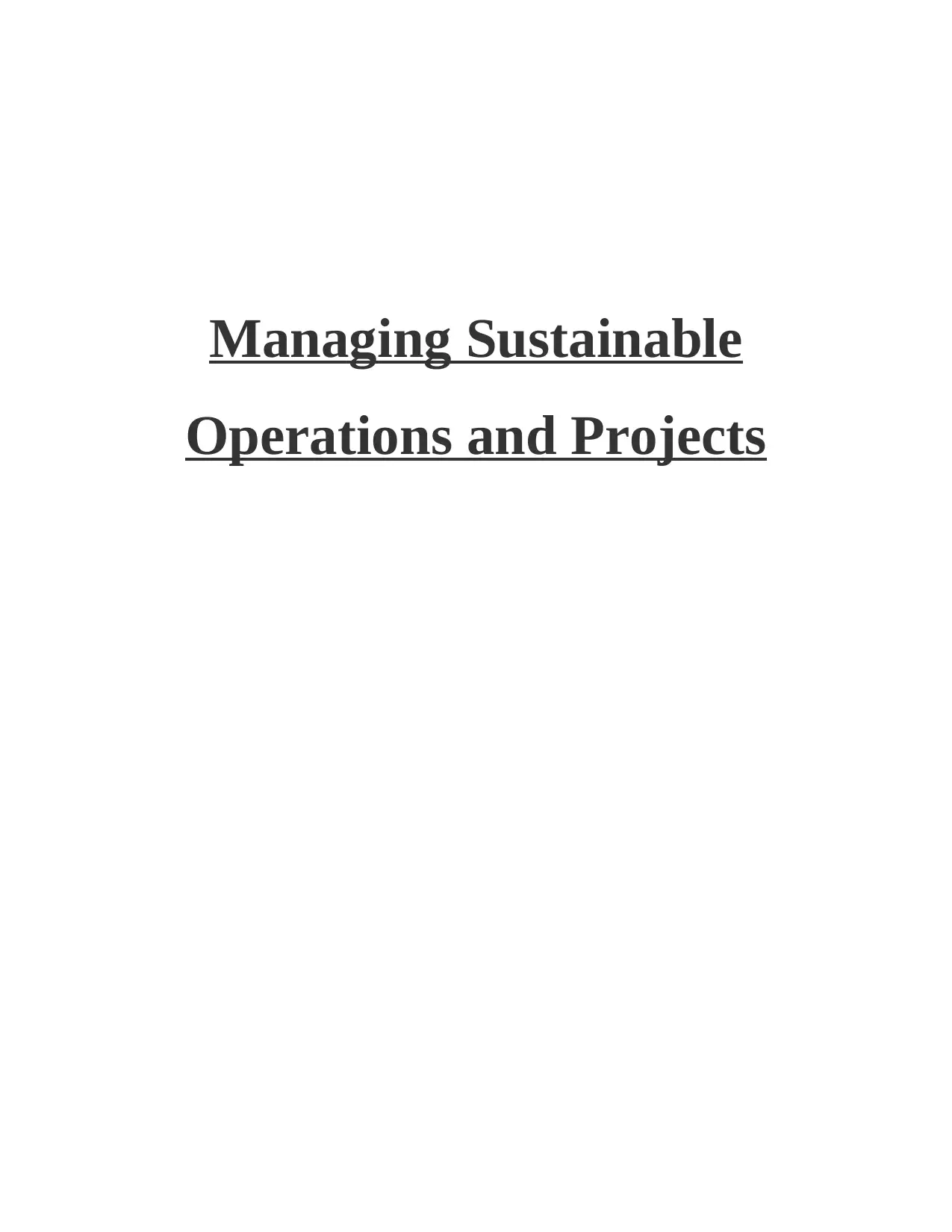
Managing Sustainable
Operations and Projects
Operations and Projects
Paraphrase This Document
Need a fresh take? Get an instant paraphrase of this document with our AI Paraphraser

Table of Contents
INTRODUCTION...........................................................................................................................3
Section 1: Outline the service including quality standards and supply chain.............................3
Section 2: Analysis of the organisation.......................................................................................5
REFERENCES................................................................................................................................8
INTRODUCTION...........................................................................................................................3
Section 1: Outline the service including quality standards and supply chain.............................3
Section 2: Analysis of the organisation.......................................................................................5
REFERENCES................................................................................................................................8
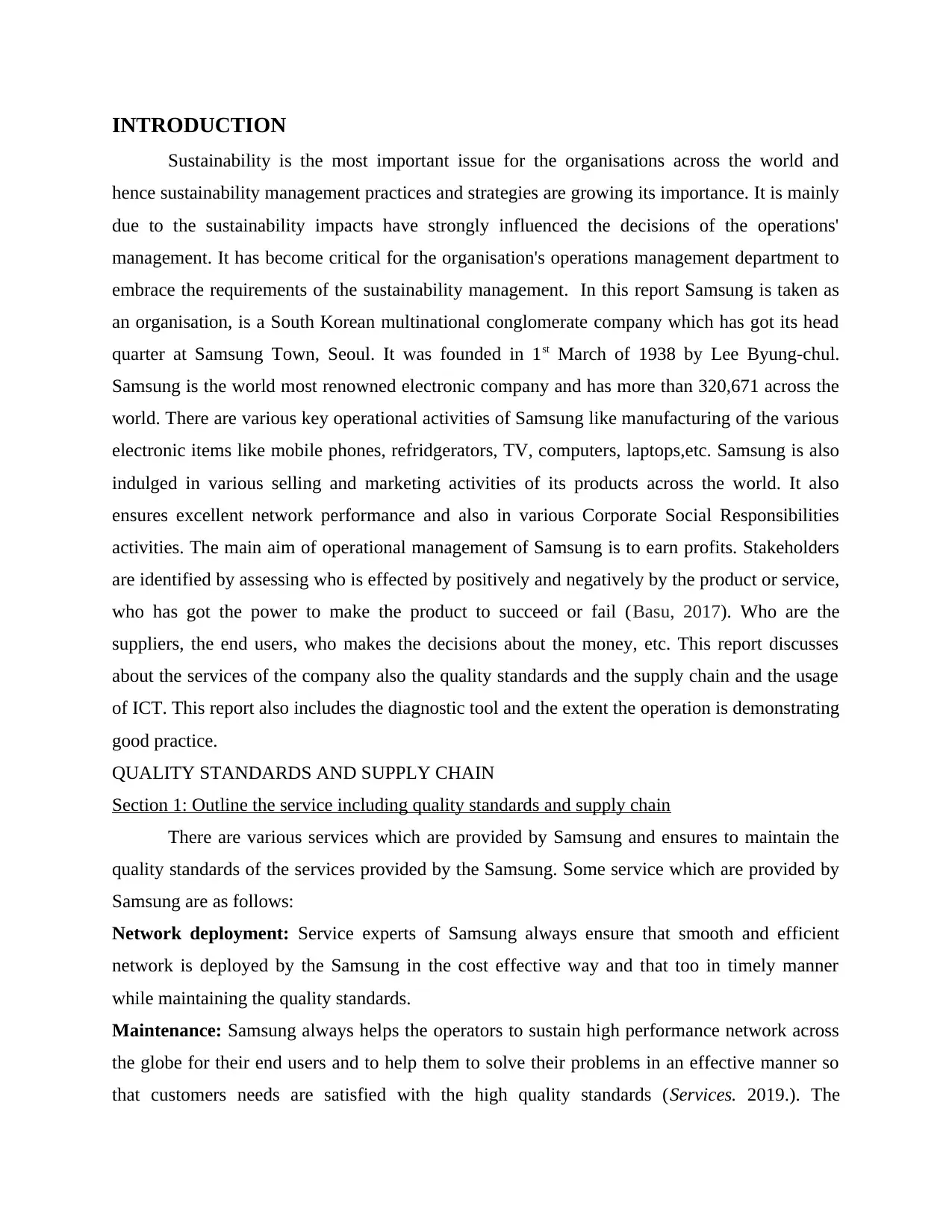
INTRODUCTION
Sustainability is the most important issue for the organisations across the world and
hence sustainability management practices and strategies are growing its importance. It is mainly
due to the sustainability impacts have strongly influenced the decisions of the operations'
management. It has become critical for the organisation's operations management department to
embrace the requirements of the sustainability management. In this report Samsung is taken as
an organisation, is a South Korean multinational conglomerate company which has got its head
quarter at Samsung Town, Seoul. It was founded in 1st March of 1938 by Lee Byung-chul.
Samsung is the world most renowned electronic company and has more than 320,671 across the
world. There are various key operational activities of Samsung like manufacturing of the various
electronic items like mobile phones, refridgerators, TV, computers, laptops,etc. Samsung is also
indulged in various selling and marketing activities of its products across the world. It also
ensures excellent network performance and also in various Corporate Social Responsibilities
activities. The main aim of operational management of Samsung is to earn profits. Stakeholders
are identified by assessing who is effected by positively and negatively by the product or service,
who has got the power to make the product to succeed or fail (Basu, 2017). Who are the
suppliers, the end users, who makes the decisions about the money, etc. This report discusses
about the services of the company also the quality standards and the supply chain and the usage
of ICT. This report also includes the diagnostic tool and the extent the operation is demonstrating
good practice.
QUALITY STANDARDS AND SUPPLY CHAIN
Section 1: Outline the service including quality standards and supply chain
There are various services which are provided by Samsung and ensures to maintain the
quality standards of the services provided by the Samsung. Some service which are provided by
Samsung are as follows:
Network deployment: Service experts of Samsung always ensure that smooth and efficient
network is deployed by the Samsung in the cost effective way and that too in timely manner
while maintaining the quality standards.
Maintenance: Samsung always helps the operators to sustain high performance network across
the globe for their end users and to help them to solve their problems in an effective manner so
that customers needs are satisfied with the high quality standards (Services. 2019.). The
Sustainability is the most important issue for the organisations across the world and
hence sustainability management practices and strategies are growing its importance. It is mainly
due to the sustainability impacts have strongly influenced the decisions of the operations'
management. It has become critical for the organisation's operations management department to
embrace the requirements of the sustainability management. In this report Samsung is taken as
an organisation, is a South Korean multinational conglomerate company which has got its head
quarter at Samsung Town, Seoul. It was founded in 1st March of 1938 by Lee Byung-chul.
Samsung is the world most renowned electronic company and has more than 320,671 across the
world. There are various key operational activities of Samsung like manufacturing of the various
electronic items like mobile phones, refridgerators, TV, computers, laptops,etc. Samsung is also
indulged in various selling and marketing activities of its products across the world. It also
ensures excellent network performance and also in various Corporate Social Responsibilities
activities. The main aim of operational management of Samsung is to earn profits. Stakeholders
are identified by assessing who is effected by positively and negatively by the product or service,
who has got the power to make the product to succeed or fail (Basu, 2017). Who are the
suppliers, the end users, who makes the decisions about the money, etc. This report discusses
about the services of the company also the quality standards and the supply chain and the usage
of ICT. This report also includes the diagnostic tool and the extent the operation is demonstrating
good practice.
QUALITY STANDARDS AND SUPPLY CHAIN
Section 1: Outline the service including quality standards and supply chain
There are various services which are provided by Samsung and ensures to maintain the
quality standards of the services provided by the Samsung. Some service which are provided by
Samsung are as follows:
Network deployment: Service experts of Samsung always ensure that smooth and efficient
network is deployed by the Samsung in the cost effective way and that too in timely manner
while maintaining the quality standards.
Maintenance: Samsung always helps the operators to sustain high performance network across
the globe for their end users and to help them to solve their problems in an effective manner so
that customers needs are satisfied with the high quality standards (Services. 2019.). The
⊘ This is a preview!⊘
Do you want full access?
Subscribe today to unlock all pages.

Trusted by 1+ million students worldwide
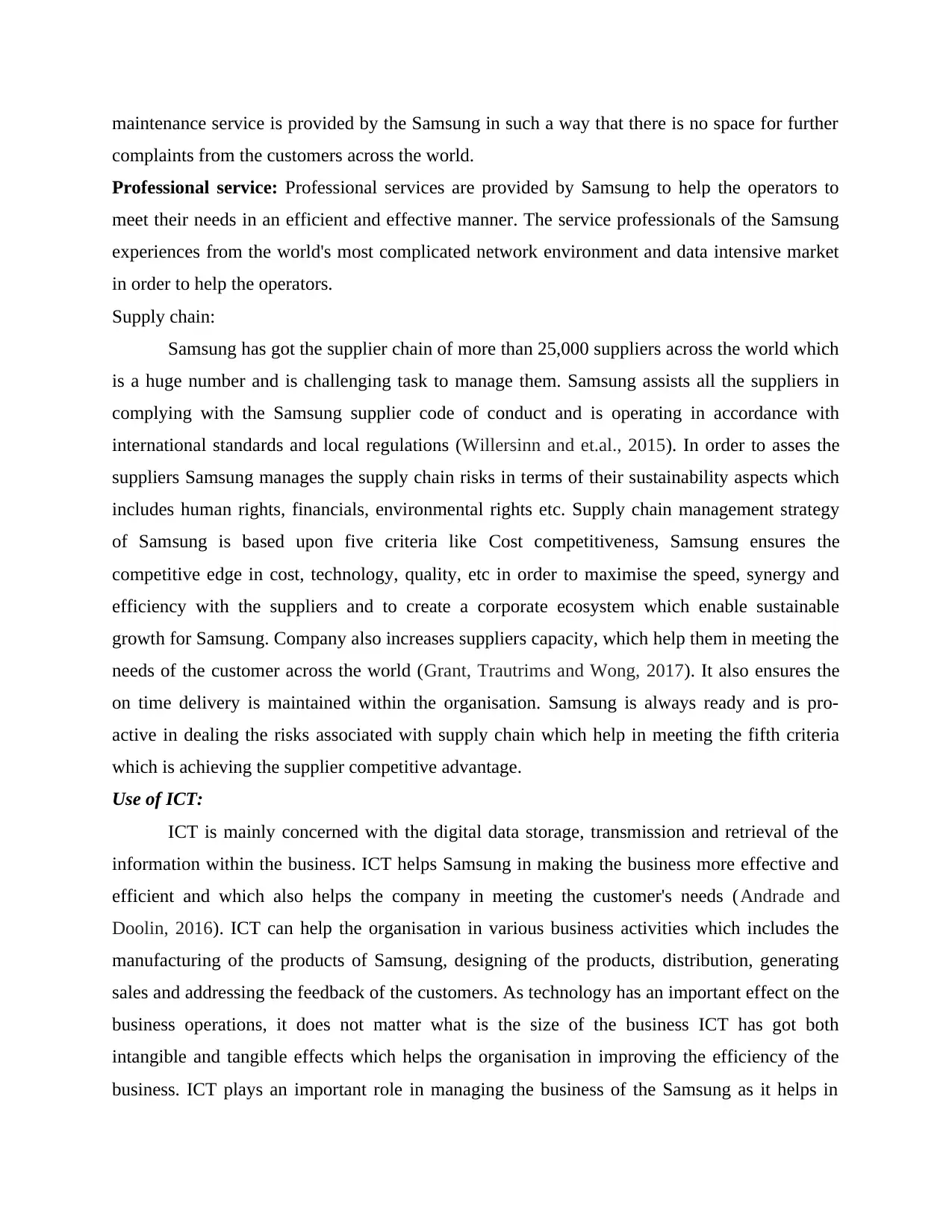
maintenance service is provided by the Samsung in such a way that there is no space for further
complaints from the customers across the world.
Professional service: Professional services are provided by Samsung to help the operators to
meet their needs in an efficient and effective manner. The service professionals of the Samsung
experiences from the world's most complicated network environment and data intensive market
in order to help the operators.
Supply chain:
Samsung has got the supplier chain of more than 25,000 suppliers across the world which
is a huge number and is challenging task to manage them. Samsung assists all the suppliers in
complying with the Samsung supplier code of conduct and is operating in accordance with
international standards and local regulations (Willersinn and et.al., 2015). In order to asses the
suppliers Samsung manages the supply chain risks in terms of their sustainability aspects which
includes human rights, financials, environmental rights etc. Supply chain management strategy
of Samsung is based upon five criteria like Cost competitiveness, Samsung ensures the
competitive edge in cost, technology, quality, etc in order to maximise the speed, synergy and
efficiency with the suppliers and to create a corporate ecosystem which enable sustainable
growth for Samsung. Company also increases suppliers capacity, which help them in meeting the
needs of the customer across the world (Grant, Trautrims and Wong, 2017). It also ensures the
on time delivery is maintained within the organisation. Samsung is always ready and is pro-
active in dealing the risks associated with supply chain which help in meeting the fifth criteria
which is achieving the supplier competitive advantage.
Use of ICT:
ICT is mainly concerned with the digital data storage, transmission and retrieval of the
information within the business. ICT helps Samsung in making the business more effective and
efficient and which also helps the company in meeting the customer's needs (Andrade and
Doolin, 2016). ICT can help the organisation in various business activities which includes the
manufacturing of the products of Samsung, designing of the products, distribution, generating
sales and addressing the feedback of the customers. As technology has an important effect on the
business operations, it does not matter what is the size of the business ICT has got both
intangible and tangible effects which helps the organisation in improving the efficiency of the
business. ICT plays an important role in managing the business of the Samsung as it helps in
complaints from the customers across the world.
Professional service: Professional services are provided by Samsung to help the operators to
meet their needs in an efficient and effective manner. The service professionals of the Samsung
experiences from the world's most complicated network environment and data intensive market
in order to help the operators.
Supply chain:
Samsung has got the supplier chain of more than 25,000 suppliers across the world which
is a huge number and is challenging task to manage them. Samsung assists all the suppliers in
complying with the Samsung supplier code of conduct and is operating in accordance with
international standards and local regulations (Willersinn and et.al., 2015). In order to asses the
suppliers Samsung manages the supply chain risks in terms of their sustainability aspects which
includes human rights, financials, environmental rights etc. Supply chain management strategy
of Samsung is based upon five criteria like Cost competitiveness, Samsung ensures the
competitive edge in cost, technology, quality, etc in order to maximise the speed, synergy and
efficiency with the suppliers and to create a corporate ecosystem which enable sustainable
growth for Samsung. Company also increases suppliers capacity, which help them in meeting the
needs of the customer across the world (Grant, Trautrims and Wong, 2017). It also ensures the
on time delivery is maintained within the organisation. Samsung is always ready and is pro-
active in dealing the risks associated with supply chain which help in meeting the fifth criteria
which is achieving the supplier competitive advantage.
Use of ICT:
ICT is mainly concerned with the digital data storage, transmission and retrieval of the
information within the business. ICT helps Samsung in making the business more effective and
efficient and which also helps the company in meeting the customer's needs (Andrade and
Doolin, 2016). ICT can help the organisation in various business activities which includes the
manufacturing of the products of Samsung, designing of the products, distribution, generating
sales and addressing the feedback of the customers. As technology has an important effect on the
business operations, it does not matter what is the size of the business ICT has got both
intangible and tangible effects which helps the organisation in improving the efficiency of the
business. ICT plays an important role in managing the business of the Samsung as it helps in
Paraphrase This Document
Need a fresh take? Get an instant paraphrase of this document with our AI Paraphraser
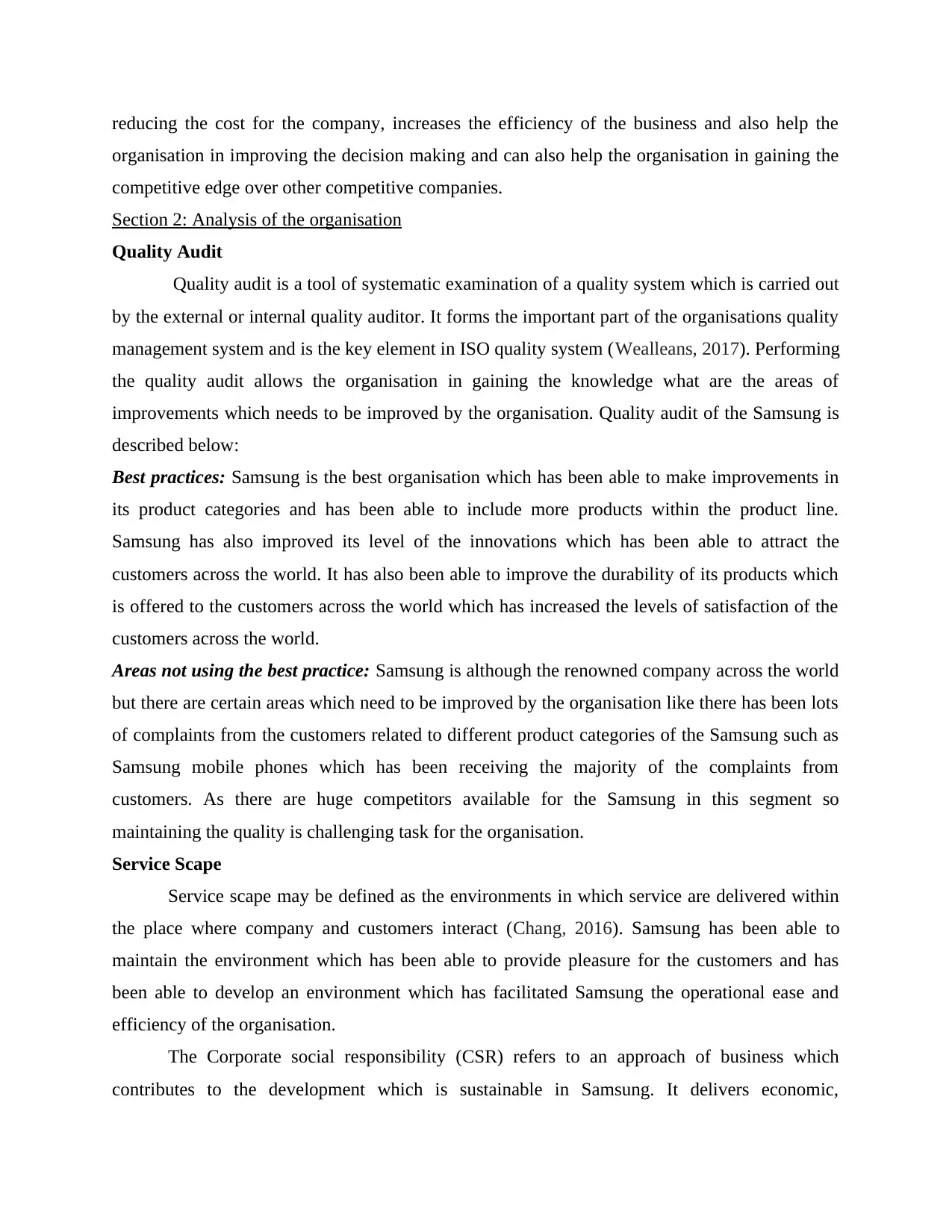
reducing the cost for the company, increases the efficiency of the business and also help the
organisation in improving the decision making and can also help the organisation in gaining the
competitive edge over other competitive companies.
Section 2: Analysis of the organisation
Quality Audit
Quality audit is a tool of systematic examination of a quality system which is carried out
by the external or internal quality auditor. It forms the important part of the organisations quality
management system and is the key element in ISO quality system (Wealleans, 2017). Performing
the quality audit allows the organisation in gaining the knowledge what are the areas of
improvements which needs to be improved by the organisation. Quality audit of the Samsung is
described below:
Best practices: Samsung is the best organisation which has been able to make improvements in
its product categories and has been able to include more products within the product line.
Samsung has also improved its level of the innovations which has been able to attract the
customers across the world. It has also been able to improve the durability of its products which
is offered to the customers across the world which has increased the levels of satisfaction of the
customers across the world.
Areas not using the best practice: Samsung is although the renowned company across the world
but there are certain areas which need to be improved by the organisation like there has been lots
of complaints from the customers related to different product categories of the Samsung such as
Samsung mobile phones which has been receiving the majority of the complaints from
customers. As there are huge competitors available for the Samsung in this segment so
maintaining the quality is challenging task for the organisation.
Service Scape
Service scape may be defined as the environments in which service are delivered within
the place where company and customers interact (Chang, 2016). Samsung has been able to
maintain the environment which has been able to provide pleasure for the customers and has
been able to develop an environment which has facilitated Samsung the operational ease and
efficiency of the organisation.
The Corporate social responsibility (CSR) refers to an approach of business which
contributes to the development which is sustainable in Samsung. It delivers economic,
organisation in improving the decision making and can also help the organisation in gaining the
competitive edge over other competitive companies.
Section 2: Analysis of the organisation
Quality Audit
Quality audit is a tool of systematic examination of a quality system which is carried out
by the external or internal quality auditor. It forms the important part of the organisations quality
management system and is the key element in ISO quality system (Wealleans, 2017). Performing
the quality audit allows the organisation in gaining the knowledge what are the areas of
improvements which needs to be improved by the organisation. Quality audit of the Samsung is
described below:
Best practices: Samsung is the best organisation which has been able to make improvements in
its product categories and has been able to include more products within the product line.
Samsung has also improved its level of the innovations which has been able to attract the
customers across the world. It has also been able to improve the durability of its products which
is offered to the customers across the world which has increased the levels of satisfaction of the
customers across the world.
Areas not using the best practice: Samsung is although the renowned company across the world
but there are certain areas which need to be improved by the organisation like there has been lots
of complaints from the customers related to different product categories of the Samsung such as
Samsung mobile phones which has been receiving the majority of the complaints from
customers. As there are huge competitors available for the Samsung in this segment so
maintaining the quality is challenging task for the organisation.
Service Scape
Service scape may be defined as the environments in which service are delivered within
the place where company and customers interact (Chang, 2016). Samsung has been able to
maintain the environment which has been able to provide pleasure for the customers and has
been able to develop an environment which has facilitated Samsung the operational ease and
efficiency of the organisation.
The Corporate social responsibility (CSR) refers to an approach of business which
contributes to the development which is sustainable in Samsung. It delivers economic,
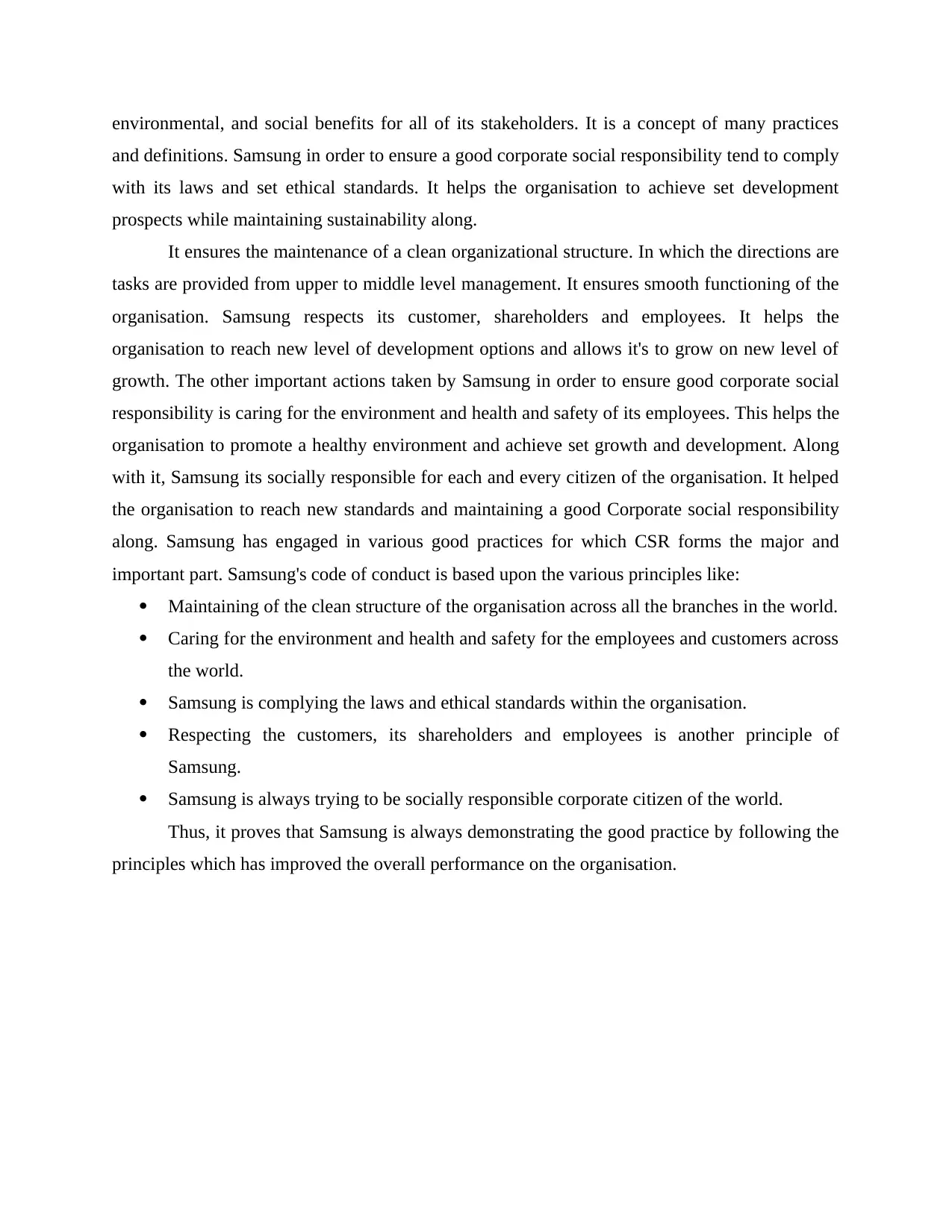
environmental, and social benefits for all of its stakeholders. It is a concept of many practices
and definitions. Samsung in order to ensure a good corporate social responsibility tend to comply
with its laws and set ethical standards. It helps the organisation to achieve set development
prospects while maintaining sustainability along.
It ensures the maintenance of a clean organizational structure. In which the directions are
tasks are provided from upper to middle level management. It ensures smooth functioning of the
organisation. Samsung respects its customer, shareholders and employees. It helps the
organisation to reach new level of development options and allows it's to grow on new level of
growth. The other important actions taken by Samsung in order to ensure good corporate social
responsibility is caring for the environment and health and safety of its employees. This helps the
organisation to promote a healthy environment and achieve set growth and development. Along
with it, Samsung its socially responsible for each and every citizen of the organisation. It helped
the organisation to reach new standards and maintaining a good Corporate social responsibility
along. Samsung has engaged in various good practices for which CSR forms the major and
important part. Samsung's code of conduct is based upon the various principles like:
Maintaining of the clean structure of the organisation across all the branches in the world.
Caring for the environment and health and safety for the employees and customers across
the world.
Samsung is complying the laws and ethical standards within the organisation.
Respecting the customers, its shareholders and employees is another principle of
Samsung.
Samsung is always trying to be socially responsible corporate citizen of the world.
Thus, it proves that Samsung is always demonstrating the good practice by following the
principles which has improved the overall performance on the organisation.
and definitions. Samsung in order to ensure a good corporate social responsibility tend to comply
with its laws and set ethical standards. It helps the organisation to achieve set development
prospects while maintaining sustainability along.
It ensures the maintenance of a clean organizational structure. In which the directions are
tasks are provided from upper to middle level management. It ensures smooth functioning of the
organisation. Samsung respects its customer, shareholders and employees. It helps the
organisation to reach new level of development options and allows it's to grow on new level of
growth. The other important actions taken by Samsung in order to ensure good corporate social
responsibility is caring for the environment and health and safety of its employees. This helps the
organisation to promote a healthy environment and achieve set growth and development. Along
with it, Samsung its socially responsible for each and every citizen of the organisation. It helped
the organisation to reach new standards and maintaining a good Corporate social responsibility
along. Samsung has engaged in various good practices for which CSR forms the major and
important part. Samsung's code of conduct is based upon the various principles like:
Maintaining of the clean structure of the organisation across all the branches in the world.
Caring for the environment and health and safety for the employees and customers across
the world.
Samsung is complying the laws and ethical standards within the organisation.
Respecting the customers, its shareholders and employees is another principle of
Samsung.
Samsung is always trying to be socially responsible corporate citizen of the world.
Thus, it proves that Samsung is always demonstrating the good practice by following the
principles which has improved the overall performance on the organisation.
⊘ This is a preview!⊘
Do you want full access?
Subscribe today to unlock all pages.

Trusted by 1+ million students worldwide
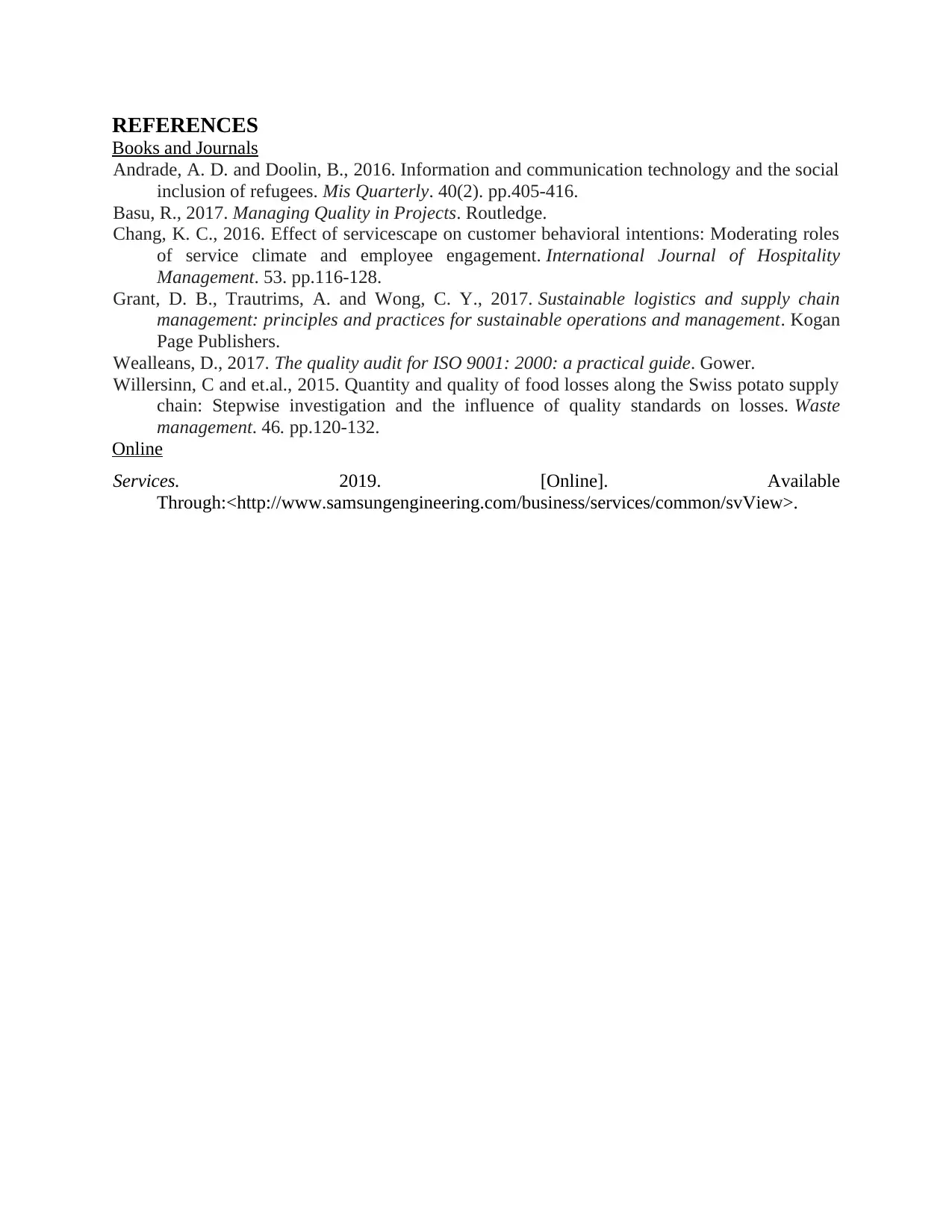
REFERENCES
Books and Journals
Andrade, A. D. and Doolin, B., 2016. Information and communication technology and the social
inclusion of refugees. Mis Quarterly. 40(2). pp.405-416.
Basu, R., 2017. Managing Quality in Projects. Routledge.
Chang, K. C., 2016. Effect of servicescape on customer behavioral intentions: Moderating roles
of service climate and employee engagement. International Journal of Hospitality
Management. 53. pp.116-128.
Grant, D. B., Trautrims, A. and Wong, C. Y., 2017. Sustainable logistics and supply chain
management: principles and practices for sustainable operations and management. Kogan
Page Publishers.
Wealleans, D., 2017. The quality audit for ISO 9001: 2000: a practical guide. Gower.
Willersinn, C and et.al., 2015. Quantity and quality of food losses along the Swiss potato supply
chain: Stepwise investigation and the influence of quality standards on losses. Waste
management. 46. pp.120-132.
Online
Services. 2019. [Online]. Available
Through:<http://www.samsungengineering.com/business/services/common/svView>.
Books and Journals
Andrade, A. D. and Doolin, B., 2016. Information and communication technology and the social
inclusion of refugees. Mis Quarterly. 40(2). pp.405-416.
Basu, R., 2017. Managing Quality in Projects. Routledge.
Chang, K. C., 2016. Effect of servicescape on customer behavioral intentions: Moderating roles
of service climate and employee engagement. International Journal of Hospitality
Management. 53. pp.116-128.
Grant, D. B., Trautrims, A. and Wong, C. Y., 2017. Sustainable logistics and supply chain
management: principles and practices for sustainable operations and management. Kogan
Page Publishers.
Wealleans, D., 2017. The quality audit for ISO 9001: 2000: a practical guide. Gower.
Willersinn, C and et.al., 2015. Quantity and quality of food losses along the Swiss potato supply
chain: Stepwise investigation and the influence of quality standards on losses. Waste
management. 46. pp.120-132.
Online
Services. 2019. [Online]. Available
Through:<http://www.samsungengineering.com/business/services/common/svView>.
1 out of 7
Related Documents
Your All-in-One AI-Powered Toolkit for Academic Success.
+13062052269
info@desklib.com
Available 24*7 on WhatsApp / Email
![[object Object]](/_next/static/media/star-bottom.7253800d.svg)
Unlock your academic potential
Copyright © 2020–2026 A2Z Services. All Rights Reserved. Developed and managed by ZUCOL.




